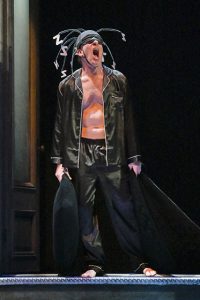Before the Brothers Grimm, before Hans Christian Andersen, there was the Roman poet Ovid, who wrote a 15-book epic of mythological tales called Metamorphoses.
Some of these fables of love and mischief and transformation inspired the director and writer Mary Zimmerman’s clever staging of Metamorphoses, first developed in Chicago more than 20 years ago, then a Broadway hit, and now getting a revival at Berkeley Repertory Theatre. Mixing ancient and modern language and dress, it breathes life into a 2,000-year-old book.
All of the action takes place in and around a large pool of water where the versatile cast of 10 tell their stories, fight, swim, splash around, make love, and sometimes drown and disappear. A few of the characters will be familiar — including Midas, the rich man who turns everything he touches to gold — though many will not (Erysichthon, anyone?).

“There was chaos at the start of the world,” we’re told as the play begins, and after the water and land were created, “man was born.” Midas (Raymond Fox), in a dark suit and tie and bare feet, seems to walk across the surface of the pool as he explains his view of the world: “It’s a proven fact that money is a good thing.” He insists he does it all for the family as his daughter (Sango Tajima) plays nearby with a red rubber ball.
Enter Bacchus (Rodney Gardiner), who looks like a party boy on spring break, bare-chested and wearing a leopard-skin skirt as he takes swigs from a bottle in a paper bag. Midas asks to be granted his wish, that he can turn all he touches into gold.
“That’s a really bad idea,” Bacchus replies before eventually granting the wish. Midas quickly discovers the truth when he touches his daughter and turns her into a frozen statue. “Take it away,” Bacchus says to end the scene.
The opening tale nicely shows the strengths of Zimmerman’s approach — the playful style of storytelling, the classical-sounding language punctuated by wisecracking humor, the spare, flexible set (by Daniel Ostling) and inventive costumes (by Mara Blumenfeld). A narrow boardwalk surrounds the pool, and there’s an ornate wooden double door upstage, a large screen showing a blue sky flecked with clouds where the gods pop up, and that’s about it.
Unlike Zimmerman’s 2007 Argonautica, which recounted the legend of Jason and the Golden Fleece, the mix of separate tales in Metamorphoses means there’s no single storyline providing structure to the whole production.
Some of Ovid’s fables are told more clearly and vividly than others. The main forces holding Metamorphoses together are the arbitrary whims and jealousies of the gods, the redeeming power of love, and the idea that the world is driven by constant change.

In one tale of transformation, a devoted couple named Alcyone (Louise Lamson) and Ceyx (Alex Moggridge) are separately lost at sea and later restored to each other as birds. They end the scene by walking off in a very birdlike way, heads bobbing, wings flapping.
In another story, Erysichthon (Steven Epp), the king of Thessaly, orders a sacred tree to be cut down. The goddess Ceres (Lamson) punishes him by bringing a famine to his kingdom and an insatiable hunger to his belly. He eventually eats himself to death.
In a more upbeat tale, an elderly couple offers food and shelter to Zeus and his son, who are disguised as beggars. As a reward, the old man and woman are granted their wish to die at the same time and are transformed into trees, their branches forever intertwined.
Each of the actors takes on several roles during the 90-minute production, playing a hero in one tale, a buffoon in the next and a vengeful god in yet another. They’re a multi-talented bunch — singing, dancing, swimming, performing all sorts of acrobatic feats beyond speaking their lines. (Still, one or two of the youngest could project their voices better over the splashing of the pool and other distractions).
It’s a witty telling of sometimes complicated stories, appealing to thoughtful teenagers as well as adults, and its heart is in the right place. Several of the actors appeared in Berkeley Rep’s 1999 West Coast premiere of Metamorphoses, and this new production must seem for them a poignant affair. While the world is constantly changing, it also circles back to fundamental principles: that the gods are fickle, humans are fallible, and you have to seize love while you can.
Metamorphoses, based on the translation of Ovid by David R. Slavitt, runs through March 10 at Berkeley Repertory Theatre, 2025 Addison Street, Berkeley, California. It plays the Guthrie Theatre in Minneapolis from April 13 to May 19.
Top image: Alex Moggridge (foreground) as Orpheus, Rodney Gardiner as Hades (background left), and Louise Lamson as Persephone in the tale of Orpheus and Euridyce in Metamorphoses at Berkeley Repertory Theatre. Photo courtesy of Kevin Berne/Berkeley Repertory Theatre.
